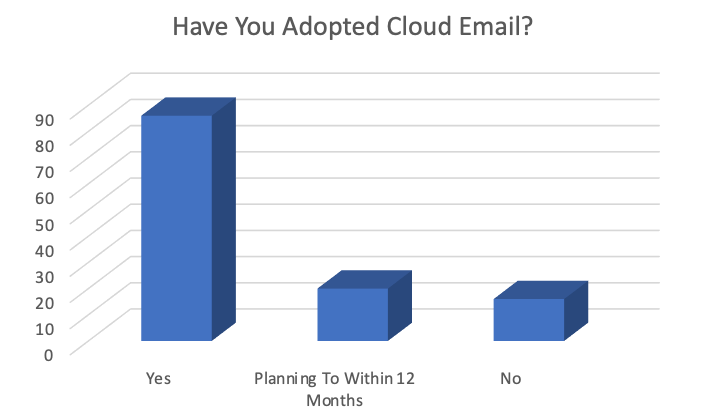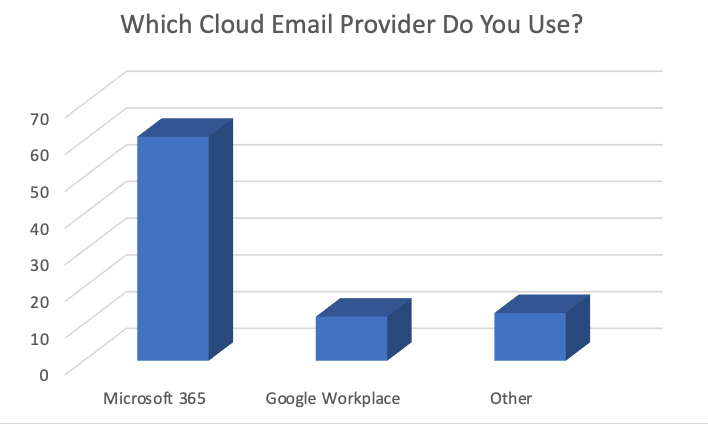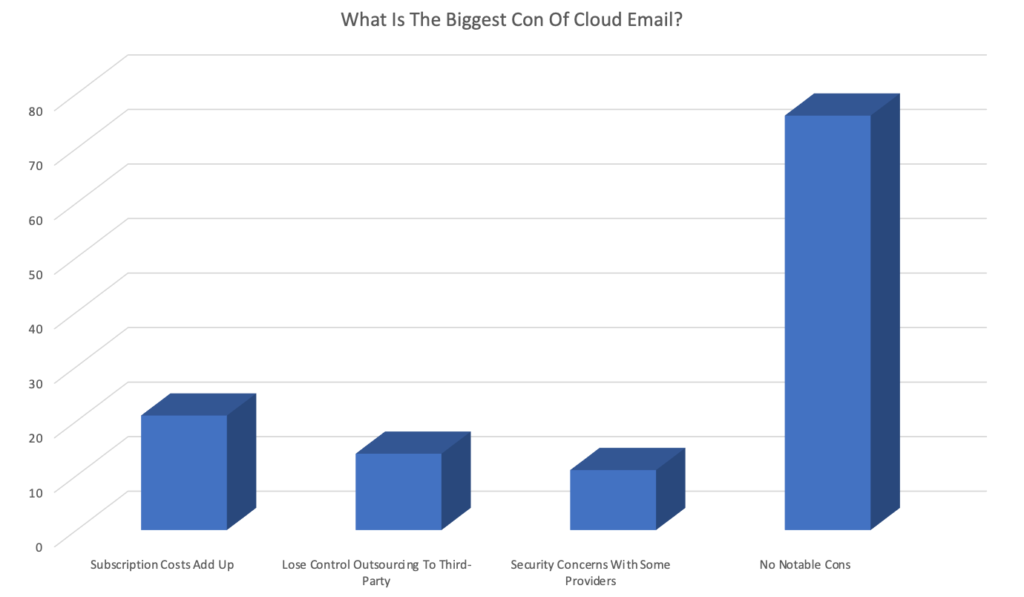More SMEs and enterprises are adopting cloud email than ever, but there are still plenty of businesses dragging their feet over migrating their email to a cloud service. I decided to look into the pros and cons of cloud email with the hopes of determining why businesses adopt cloud email and why some simply refuse to.
The pros and cons of cloud email are:
We took a unique approach to discovering the pros and cons we’ve listed above. We conducted a sizeable survey of our customers, with 122 UK-based SMEs partaking, offering their thoughts on the pros and cons of adopting cloud email. We asked a series of questions, using our customers’ responses to put together the list of pros and cons.
Firstly, we wanted to find out just how many of our customers have adopted cloud email.
How Many Businesses Have Adopted Cloud Email?
Before looking at the pros and cons, we thought it was important to find out how many businesses have actually adopted cloud email. Out of our 122 respondents, here’s what we found.

70.49% of respondents stated they had adopted cloud email, whereas a further 16.39% said they planned to adopt cloud email within the next 12 months. Only 13.11% of respondents stated that they hadn’t adopted cloud email and had no intention of migrating their emails to the cloud within the next 12 months.
So the vast majority of respondents have already adopted cloud email, or intent to do so within a year. Only 16 of 122 businesses we surveyed said that they wouldn’t consider migrating their emails to the cloud. If you’re wondering why, we’ll explain that in the ‘cons’ section of this blog post.
However, a natural second question was if you have adopted cloud email, which provider are you using? Here’s what the 86 businesses already using cloud email responded.

Out of the 86 businesses that have adopted cloud email, a massive 70.93% use Microsoft’s Microsoft 365 cloud email offering. This seemingly suggests that Microsoft have a stranglehold on the cloud email market, particularly where SMEs are concerned.
13.95% of the businesses partaking in our survey use Google Workplace (formally known as G-Suite). 13 of the businesses use a variety of other providers, such as Zoho and Bluehost email hosting. However, the majority of respondents use either M365 or Google Workplace.
On Business Tech Planet, we’ve blogged about Microsoft 365 a lot in the past, including our in-depth article on the cost of a M365 licence and our post discussing the benefits of M365. They’re well worth a read if you’re considering whether or not to adopt cloud email, because Microsoft 365 is one of the very best options for SMEs looking for a third-party email hosting provider.
Next, we decided to survey our customers on what they considered the biggest pros and cons of adopting cloud email. Based on the responses we received, here are the most important pros and cons you must consider before migrating your email to the cloud.

The Pros Of Cloud Email
As part of creating this blog post, we thought it was important to determine the pros of cloud email from the businesses actually using it. Similarly, we needed to figure out why businesses were choosing not to use cloud email.
As part of our survey, we listed 5 potential pros of cloud email and 5 potential cons. The pros we’re discussing in this blog post we’re discussing in this blog post are what most businesses using cloud email agreed are the greatest advantages of migrating their email to the cloud.
Likewise, the 3 cons we’re going to detail are based on the responses of business leaders participating in our survey.
The graph below shows respondents’ answers to the question what is the biggest pro of cloud email? This multi-choice section of the survey prompted respondents to select what they thought was the biggest pro of cloud email from 5 options.

38.37% of the business leaders participating in our survey chose cost savings as the main pro of cloud email. This wasn’t surprising to us, as costs are obviously a crucial consideration for businesses. And as we’ll detail soon, using cloud email can be significantly more cost-effective than hosting your own email on-site.
As you can see, other popular responses were simple management, excellent uptime, accessible from anywhere, and industry-leading security.
Let’s take a more in-depth look at each of these pros.
Cloud Email Pro #1: Cost Savings
According to the vast majority of our respondents using cloud email, the main driving force between migrating their email to a cloud service was cost savings.
Legacy options such as on-premises email can be very expensive. First and foremost, there is the expense of purchasing the hardware you require. Secondly, you have the costs of maintaining the hardware to consider.
The difference with cloud email is there are no upfront costs. Instead, cloud email is available on a subscription basis. There’s no purchasing equipment or ongoing maintenance costs to speak of. You simply pay your monthly/annual subscription fee and that’s it. Depending on the number of email accounts you need, this can prove significantly more cost-effective than hosting your own emails.
Cloud Email Pro #2: Simple Management
20.93% of respondents stated simple management as the biggest reason of using cloud email. Obviously, simplicity and ease of use are important to businesses of all sizes, but undoubtedly SMEs in particular.
With cloud email, especially when you are using a third party such as Microsoft, there isn’t an awful lot you have to manage as a business. In fact, the vast majority is done for you and everything just works!
Particularly for SMEs that might not have any in-house IT professionals, this is a big pro. A service such as Microsoft 365 usually just works, meaning there isn’t much management required. On the other hand, there is an argument for outsourcing your email management to a reputable MSP in case there ever are any issues.
Cloud Email Pro #3: Excellent Uptime
With a cloud-based email provider, you should expect excellent uptime. In fact, 18.6% of participants stated this as the biggest advantage of cloud email.
When you’re hosting your email in-house, uptime is down to you. If there’s ever an issue with your email service, it is down to your business to resolve it. How good is your setup? Is it really reliable enough considering how important emails are to a business?
When you outsource to a cloud-based email provider, their email hosting infrastructure is going to be so much more reliable than anything that an SME could have.
The biggest cloud-based email providers have massive data centres with round the clock management, monitoring, and maintenance. They have redundancy data sites, meaning your email won’t go down even if the primary site does. In the unlikely occurrence of downtime, your provider will have excellent response times, ensuring your service will be restored sooner rather than later. Businesses hosting their emails on-premises have none of this, so they may lose their emails for much longer.
Cloud Email Pro #4: Accessible From Anywhere
More businesses than ever are establishing remote teams or allowing their employees to work from home at least part of the time. As a result, it’s becoming increasingly important to have communication solutions that can be used anywhere on any device. This brings to one of the biggest advantages of cloud email, in that you can access it from anywhere as long as you have your credentials.
As long as you have an internet connection, you can access and use a cloud-based email account no matter where you are on any internet-enabled device with a browser. There were more restrictions with some legacy solutions, such as only being able to access your email when you were in the office.
Cloud Email Pro #5: Industry-Leading Security
When you are using cloud email, all of your company emails are stored in a highly secure, remote location. Reputable cloud email providers take security very seriously, deploying industry-leading software and hardware to protect email accounts and their contents.
Only 8.13% of respondents stated this as the biggest pro of cloud email, but it’s certainly one of the most notable benefits. After all, how secure is on-premises email? Cloud-based email providers such as Microsoft have spent millions on security. It’s unfeasible that any business could do the same for their on-premises email, particularly an SME.
Securing your data is very important, especially with data breaches on the rise. According to Carbon Black, 88% of UK companies suffered a data breach in the last 12 months. With that in mind, why take the risk with your business emails?
The Cons Of Cloud Email
While the vast majority survey respondents are using cloud email or plan to migrate their email to it within 12 months, a sizeable chunk (13.11%) don’t intend to begin using cloud email anytime soon.
As part of the survey, we asked all three groups of businesses (those using cloud email, those intending to use cloud email, and those not planning to) what they thought the biggest con of cloud email was.
The table below displays the responses from the survey participants.

17.21% stated that subscription costs adding up is the biggest con of cloud email. Other respondents said that losing control of their emails is a concern, as is the reliability of certain providers’ security.
Let’s have a look at these cons in more detail, because it’s crucial you consider them if you are thinking of migrating your emails to the cloud.
Cloud Email Con #1: Subscription Costs Add Up
Turning arguably one of the biggest advantages of using cloud email on its head, 21 business leaders expressed concern over subscription costs adding up.
While some businesses save money by choosing cloud email, does it end up being a more expensive option for some businesses?
In our article, How Much Is A Microsoft 365 Licence? We discovered that the cheapest M365 business licence is the M365 Business Basic which, at the time of writing, costs £3.80 per user excluding VAT monthly. This gives you a 50GB mailbox, so it’s a very basic option (as the name suggests). Most businesses will need to go for a more expensive option.
Multiply that licence cost by the number of users you have and it soon adds up!
You must take the time to work out which email option financially makes sense for your business. For the vast majority of SMEs, cloud-based email makes sense financially in terms of long-term costs and short-term cash flow. That doesn’t mean it’ll be the same for all businesses, however. And consider the fact that your business may grow in the future, necessitating an investment in even more licences.
Cloud Email Con #2: Lose Control Of Your Emails Outsourcing To A Third-Party
14 of the business leaders who participated in our survey expressed concern over losing control of their emails by outsourcing to a third-party cloud email provider.
All cloud-based email solutions cause you to lose physical control over your emails. After all, they’re in the cloud rather than stored on hardware in your office! However, this should only be a concern if you go with a provider that you cannot trust. You have nothing to worry about by outsourcing to a provider such as Microsoft or Google, because they are reputable.
That’s the important point to make here. If this is the main concern that’s putting you off migrating to the cloud, simply choose a provider that you can trust. Furthermore, you can have local backups of your email accounts, should you wish.
Cloud Email Con #3: Security Concerns With Some Providers
11 business leaders said that security concerns are the biggest reason that they want to continue with on-premises email rather than cloud email, and that’s understandable in a respect. Emails are a business essential; one of the primary methods of communicating both internally and with the outside world.
A point to make here is that cloud-based emails are very secure, as long as you choose a reputable provider.
Of course there are some dodgy providers out there that cannot offer top notch email security. However, you can easily avoid them and just go for one of the big names, such as Microsoft, Google, or Bluehost.
These companies have spent hundreds of thousands if not millions on their security solutions, so you know you can rely upon them to keep your email secure. And really, how secure is your on-premises email? How many people have access to the physical business? What if one of your employees had malicious intent and tried to do some damage?
I hope this blog post, combined with our research and survey results, can help you and your organisation to decide if cloud email is the way forward for you. If you’d like to find out more, please feel free to leave a comment below and I’d be happy to have a chat!
